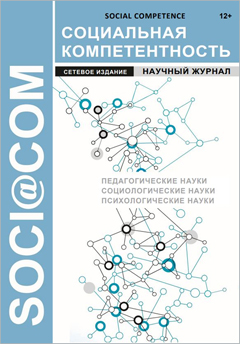A model for preventing adolescent mobile addiction
DOI:
https://doi.org/10.24866/2658-5855/2023-4/42-52Keywords:
mobile addiction, prevention, methodological approaches, principles, pedagogical conditions, parentsAbstract
The study presents a conceptual model for the prevention of adolescent mobile addiction in the interaction of a classroom teacher and parents, including targeted, content-organizational and performance-evaluation blocks. The methodological basis for the implementation of the model is axiological, systemic and activity-based approaches implemented in the principles of health conservation, synergy, constructive interaction and personal orientation. The content and organizational block of the model is represented by pedagogical conditions (constructive interaction between the class teacher and the parent, the systematic nature of preventive measures, the proactive nature of the impact on the risk situation), implemented in three stages: raising awareness of parents (passive), involving parents in various forms of activity (active), joint activities of the class teacher and parents (interactive). The performance evaluation block presents criteria for diagnosing the effectiveness of the implementation of pedagogical conditions in cognitive, social and value components at high, medium or low levels. The article presents an analysis of sources on the problems of mobile-dependent behavior of adolescents, clarifying the concept of "mobile dependence of adolescents.
Downloads
References
Иванов М. С. Психологические аспекты негативного влияния игровой компьютерной зависимости на личность человека. Кемерово, 1999. http://www.flogiston.ru/articles. (дата обращения: 30.01.2023). Ivanov M.S. Psychological aspects of the negative impact of gaming computer addiction on a person's personality. Kemerovo, 1999. (In Russ.). http://www.flogiston.ru/articles (accessed: 30.01.2023).
Саглам Ф.А. Исследование проблем Интернет-аддикций в подростковом возрасте // Педагогическое образование и наука. 2008. № 4. С. 55–58. Saglam F.A. Research on the problems of Internet addiction in adolescence. Pedagogical education and science, 2008, no. 4, pp. 55–58. (In Russ.).
Бредихина М.В. Педагогическая профилактика игровых зависимостей у подростков в общеобразовательном учреждении: автореф. дис. ... канд. пед. наук: 13.00.01. Нижний Новгород, 2007. 21 с. Bredikhina M.V. Pedagogical prevention of gaming addictions in adolescents in a general education institution: Abstract of PhD (Pedagogy) Thesis. Nizhny Novgorod, 2007. 21 p. (In Russ.).
Плешаков В.А., Угольков Н.В. Интернет как фактор социализации старших школьников // Философские проблемы информационных технологий и киберпространства. 2012. № 2(4). С. 48–54. Pleshakov V.A., Ugolkov N.V. Internet as a factor of socialization of senior schoolchildren. Philosophical problems of information technologies and cyberspace, 2012, no. 2(4), pp. 48–54. (In Russ.).
Галагузова Ю.Н., Лабарешных Н.Н. Профилактика мобильной зависимости подростков в деятельности классного руководителя // Педагогическое образование в России. 2021. № 6. С. 171–177. Galaguzova Yu.N., Labareshnykh N.N. Prevention of adolescent mobile addiction in the classroom teacher's activities. Pedagogical education in Russia, 2021, no. 6, pp. 171–177. (In Russ.).
Сластенин В.А., Исаев И.Ф., Шиянов Е.Н. Педагогика: учебник для студентов высших учебных заведений / под ред. В. А. Сластенина. 8-е изд. Москва: Академия, 2008. 566 с. Slastenin V.A., Isaev I.F., Shiyanov E.N. Pedagogy. Ed. by V.A. Slastenin. 8th ed. Moscow, Academia Publ., 2008. 566 p. (In Russ.).
Вишнякова С.М. Профессиональное образование: словарь. Ключевые понятия, термины, актуальная лексика. Москва, 1999. 538 с. Vishnyakova S.M. Professional education: dictionary. Key concepts, terms, relevant vocabulary. Moscow, 1999. 538 p. (In Russ.).
Сагатовский В.Н. Категориальный контекст деятельностного подхода // Деятельность: теория, методология, проблемы. Москва: Политиздат. 1990. С. 70–82. Sagatovsky V.N. The categorical context of the activity approach. Activity: theory, methodology, problems. Moscow, Politizdat Publ., 1990. pp. 70–82. (In Russ.).
Дружинина А.А. Личностно-ориентированный подход как целеполагающий в формировании управленческой культуры студента – будущего социального работника // Вестник Томского государственного университета. 2012. № 12(116). С. 82–87. Druzhinina A.A. A personality-oriented approach as a goal–setting in the formation of the managerial culture of a student – a future social worker. Bulletin of Tomsk State University, 2012, no. 12(116), pp. 82–87. (In Russ.).
Методические рекомендации по созданию в образовательной организации здоровьесберегающих условий, способствующих психическому развитию и укреплению здоровья детей с ОВЗ и детей-инвалидов. Москва: ИКП РАО, 2022. https: https://ds63-schel.edumsko.ru/activity/-psih_ped/support/post/1949521/doc/29430 (дата обращения: 30.01.2023). Methodological recommendations for the creation of health-saving conditions in an educational organization that promote mental development and strengthen the health of children with disabilities and children with disabilities. Moscow, ICP RAO Publ., 2022. (In Russ.). https://ds63-schel.edum-sko.ru/activity/psih_ped/support/post/1949521/doc/29430 (accessed: 30.01.2023).
Синергетический подход в развитии профессионального мастерства современного педагога // Актуальные проблемы педагогики и психологии: материалы Международной заочной научно-практической конференции (27 февраля 2012 г.). Новосибирск: Сибирская ассоциация консультантов, 2012. Ч. II. С.122–133. Synergetic approach in the development of professional skills of a modern teacher. Actual problems of pedagogy and psychology. Materials of the international correspondence scientific and practical conference. Part II (February 27, 2012). Novosibirsk, Siberian Association of Consultants Publ., 2012, pp.122–133. (In Russ.).
Лабарешных Н.Н., Галагузова Ю.Н. Взаимодействие классного руководителя и родителей в профилактике мобильной зависимости подростков // Актуальные проблемы социогуманитарного образования: сборник статей / под науч. ред. Е.В. Донгаузер, Т.С. Дороховой. Екатеринбург, 2022. С. 150–153. Labareshnykh N.N., Galaguzova Yu.N. Interaction of the class teacher and parents in the prevention of mobile addiction of adolescents. Actual problems of socio-humanitarian education. Collection of articles. Ed. by E.V. Dongauzer, T.S. Dorokhova. Yekaterinburg, 2022. pp. 150–153. (In Russ.).
Болбаков Р.Г. Анализ когнитивности в науке и образовании // Перспективы науки и образования. 2014. № 4(10). С. 15–19. Bolbakov R.G. Analysis of cognition in science and education. Prospects of Science and Education, 2014, no. 4(10). pp. 15–19. (In Russ.).
Котляров И.Д. Виртуальная реальность как пространство удовлетворения потребностей // Прикладная информатика. 2006. № 6(6). С. 101–111. Kotlyarov I.D. Virtual reality as a space for satisfying needs. Applied Informatics, 2006, no. 6(6), pp. 101–111. (In Russ.).
Кузнецов Р.А., Коломийченко Л.В. Ценностные ориентации как фактор формирования базовой культуры личности // ЦИТИСЭ. 2019. № 2(19). С. 29–36. Kuznetsov R.A., Kolomiichenko L.V. Value orientations as a factor in the formation of basic personality culture. CITISE, 2019, no. 2(19), pp. 29–36. (In Russ.).
Downloads
Published
Issue
Section
License
Copyright (c) 2023 Наталья Николаевна Лабарешных, Елена Владимировна Москвина

This work is licensed under a Creative Commons Attribution-NonCommercial-NoDerivatives 4.0 International License.


